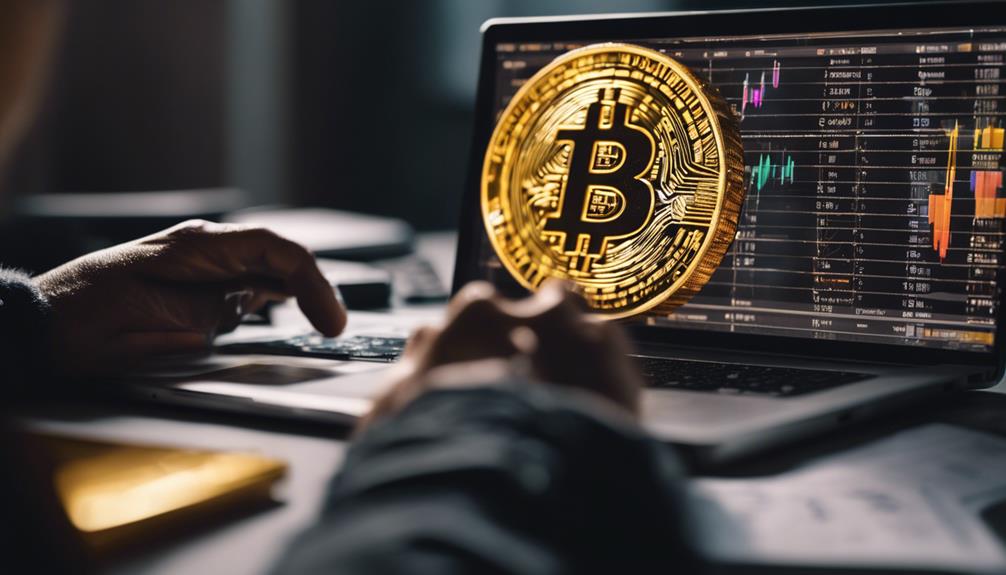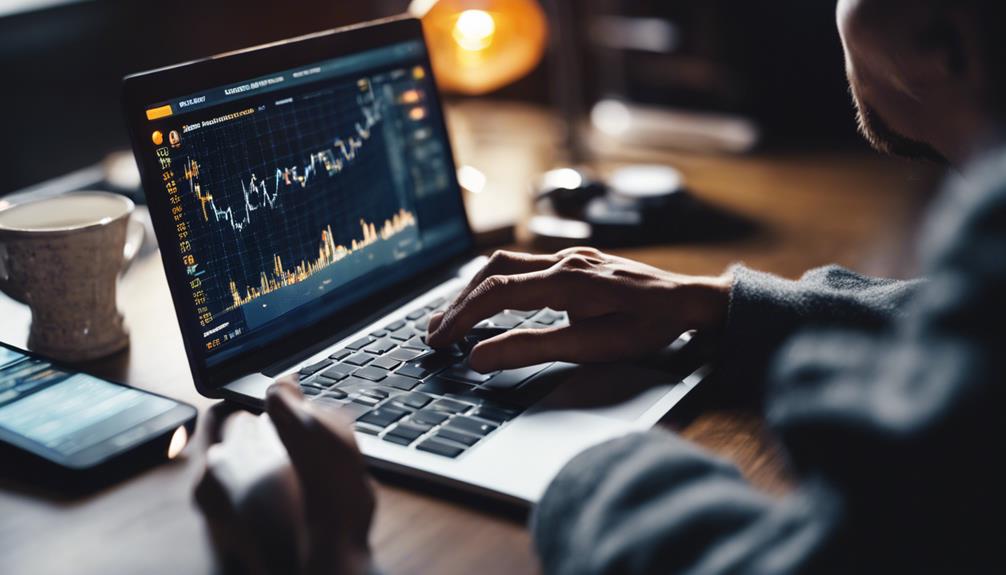To begin investing in a Bitcoin IRA, choose a trustworthy provider like Directed IRA. Decide whether to transfer funds or make new contributions. Actively oversee your cryptocurrency investments within the tax-advantaged IRA framework. Ensure the safety of your assets by storing cryptocurrencies in cold storage. Funding options include transferring from traditional IRAs or making new contributions, each with tax implications. Consider transferring and trading on Gemini for secure transactions with fees ranging from 0.25% to 0.35%. Enhance security by moving your assets to cold storage, especially for long-term storage. Stay aware of fluctuating fee structures and manage trade fees for competitive rates. More insights are available on the journey to Bitcoin IRA investments.
Key Takeaways
- Choose a reputable provider like Directed IRA for Bitcoin IRA investments.
- Decide between funding options: rollover funds or make new contributions.
- Set up transfers to Gemini for secure cryptocurrency trading.
- Enhance security by moving holdings to cold storage offline.
- Be mindful of fee structures including setup, maintenance, and transaction fees.
Setting Up a Crypto IRA
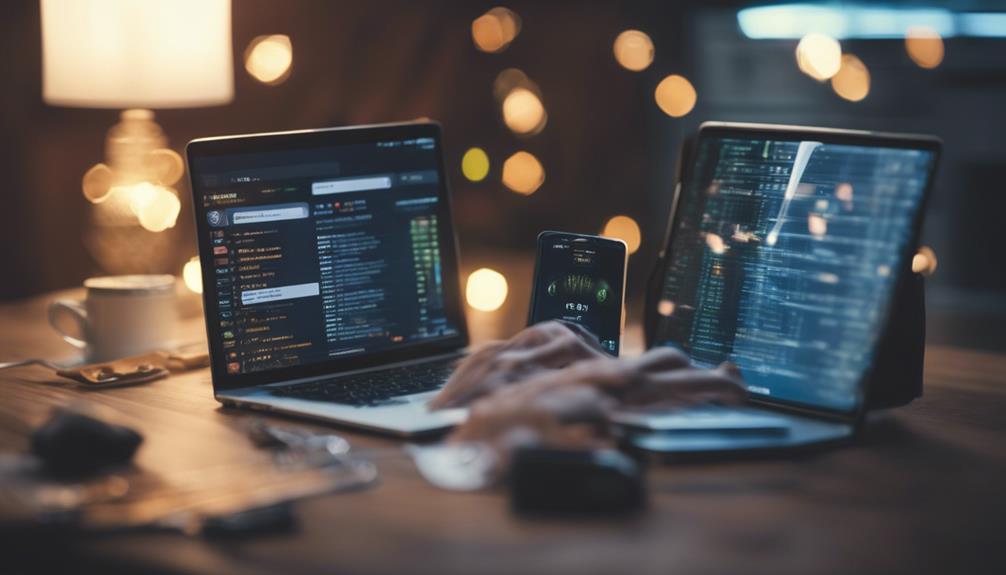
When establishing a Crypto IRA, streamline the process by choosing a reputable provider like Directed IRA for seamless investment in cryptocurrencies like Bitcoin. Directed IRA offers the opportunity to invest in various cryptocurrencies, including Bitcoin, within the tax-advantaged structure of an IRA. You can roll over funds from an existing retirement account or make new contributions specifically into the crypto IRA for trading purposes. This flexibility allows you to actively manage your cryptocurrency investments while enjoying the significant benefits of an IRA.
One significant consideration when setting up a crypto IRA is the security of your assets. Directed IRA provides the option to move your crypto holdings to cold storage, enhancing the safety of your investments by storing them offline. This added layer of security helps protect your digital assets from online threats such as hacking or cyber theft. By utilizing cold storage, you can have peace of mind knowing that your cryptocurrencies are safeguarded against potential risks.
Choosing Between Rollover or Contributions

Consider whether to opt for a rollover or make contributions when deciding how to fund your Bitcoin IRA. Rollover involves transferring funds from traditional IRAs or Roth IRAs into a Bitcoin IRA, consolidating retirement savings into cryptocurrency. On the other hand, contributions entail investing new funds directly into the Bitcoin IRA, allowing for fresh investments in Bitcoin for retirement. While rollover offers the benefit of consolidating retirement savings into a Bitcoin IRA, it may come with tax implications. Conversely, contributions provide immediate investment opportunities without the complexities of tax implications. To help you decide which option suits you best, here is a comparison table:
| Feature | Rollover | Contributions |
|---|---|---|
| Source of Funds | Traditional IRAs or Roth IRAs | New funds |
| Benefit | Consolidation of retirement savings | Immediate investment opportunities |
| Tax Implications | Possible tax implications | Minimal tax implications |
Transferring Funds to Gemini Account
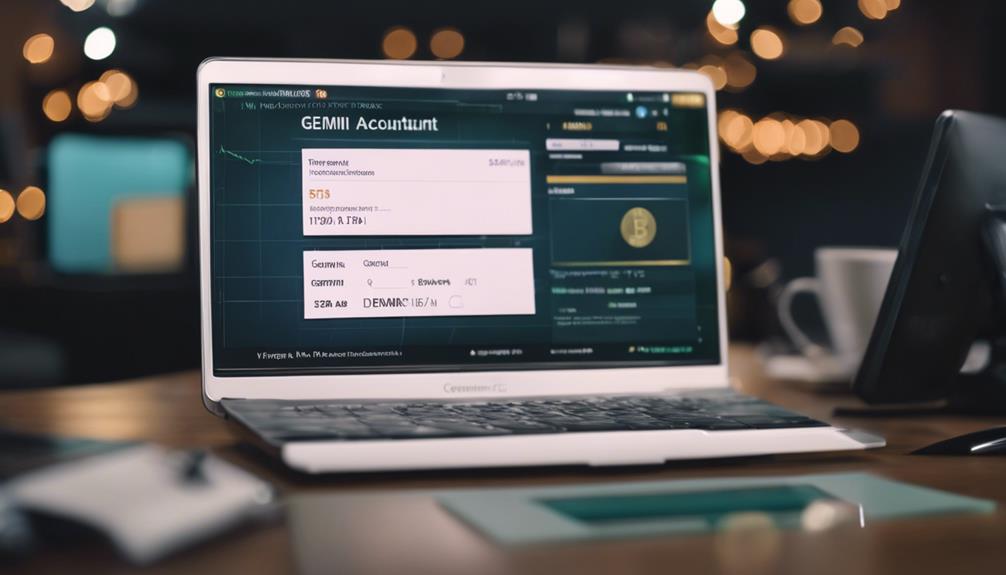
To transfer funds to a Gemini account, you need to authorize the transfer from your crypto IRA. Gemini, as a regulated and licensed trust company, offers a secure platform for your transactions. They provide insurance coverage amounting to a couple hundred million, adding an extra layer of safety to your investments. When evaluating the safety of your funds, it's important to assess the option of leaving your crypto on the exchange versus moving it to cold storage for added security.
Additionally, before initiating the transfer, it's vital to take into account the fees associated with transferring funds to Gemini. Make sure you have a clear understanding of the fee structure and payment processes to avoid any surprises during the transfer. By being mindful of these aspects, you can ensure a smooth and informed process when transferring your funds to your Gemini account.
Trading Cryptocurrencies on Gemini
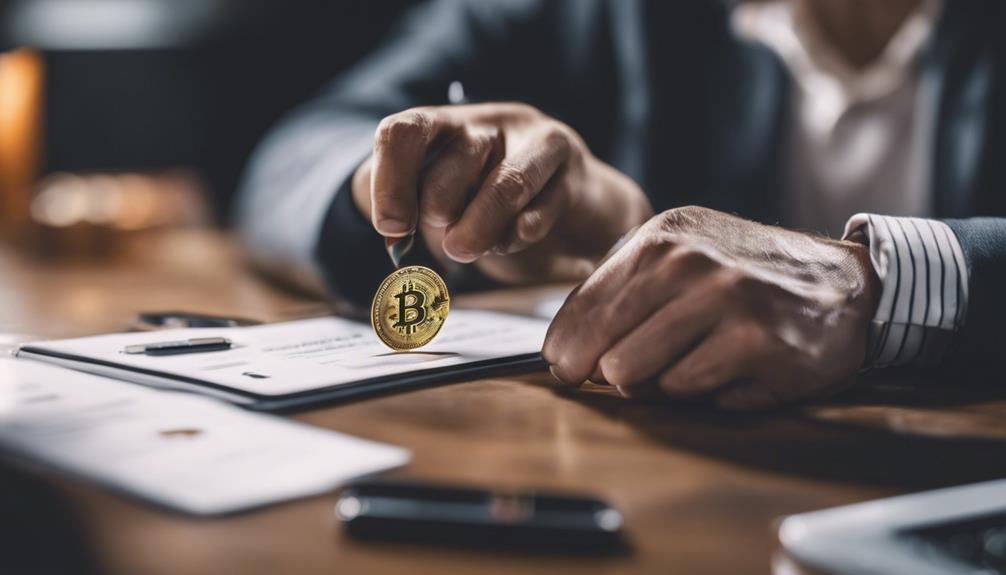
Understanding the basics of trading cryptocurrencies on Gemini is crucial. This includes mastering how to execute trades efficiently.
Gemini also highlights security as a priority. They implement measures like two-factor authentication and cold storage to protect your investments.
Managing your cryptocurrency holdings on Gemini involves monitoring market trends, making informed decisions, and adjusting your portfolio accordingly.
Gemini Trading Basics
Exploring the Gemini platform for trading cryptocurrencies offers investors a secure and regulated environment to investigate a variety of digital assets. With Gemini, users can access over 20 different cryptocurrencies, making it a versatile platform for cryptocurrency trading.
When conducting trades on Gemini, bear in mind that they charge a trade fee ranging from 0.25% to 0.35%, which is crucial to keep in mind when managing your investments.
For those interested in using their Bitcoin IRAs for crypto investments, Gemini allows for the transfer of funds from Directed IRAs to their trading accounts.
Additionally, Gemini provides insurance coverage worth hundreds of millions to safeguard users' assets, adding an extra layer of security to your investments.
Security Measures in Place
Have you thought about how Gemini guarantees security when trading cryptocurrencies on their platform?
As a regulated trust company, Gemini offers insurance coverage amounting to a couple hundred million, providing added security for investors.
You have the option to keep your cryptocurrencies on the exchange or transfer them to cold storage, enhancing their safety.
Gemini implements internal controls and security features for cold storage, ensuring the protection of your assets.
Before engaging in cryptocurrency trading on Gemini, it's essential to evaluate their reputation, security measures, and fees. Understanding these aspects will help you make informed decisions and safeguard your investments effectively.
Managing Cryptocurrency Holdings
To effectively manage your cryptocurrency holdings on Gemini, consider diversifying your portfolio across a range of 20+ crypto options available for trading. Gemini, a regulated trust company, offers insurance for holding cryptocurrencies and charges a trade fee ranging from 0.25% to 0.35%.
For enhanced security, think about moving your cryptocurrencies to cold storage. Before trading on Gemini, evaluate the platform's reputation and security features to guarantee a safe trading experience.
Moving Crypto to Cold Storage
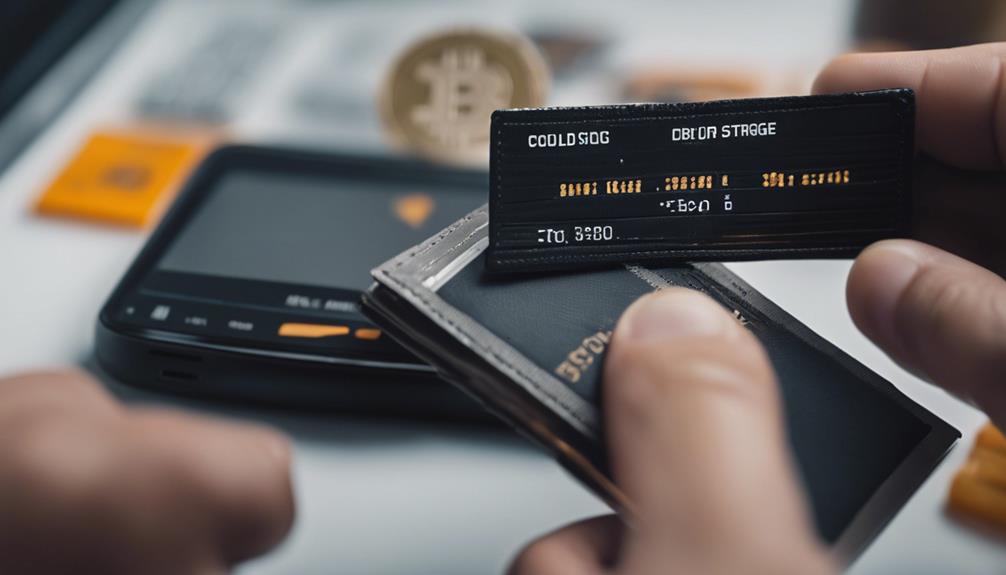
Safeguard your cryptocurrency holdings by securely moving them to cold storage offline. When investing in Bitcoin through an IRA account, it's important to prioritize security. Cryptocurrency exchanges are vulnerable to hacking, making cold storage, such as hardware wallets, a safer option. Hardware wallets store your crypto keys offline, reducing the risk of online attacks. This method is highly secure, as it keeps your assets out of reach from potential threats on the internet.
Hardware wallets are physical devices that store your cryptocurrency keys offline, adding an extra layer of protection. Paper wallets and offline computers are also popular forms of cold storage. These methods are recommended for long-term storage of significant amounts of cryptocurrency, ensuring that your investments remain secure. By moving your crypto to cold storage, you can have peace of mind knowing that your assets are safe from potential online vulnerabilities.
Understanding Fee Structure

When considering a Bitcoin IRA, it's important to grasp the fee structure, which can include annual account fees, transaction fees per trade, and additional charges for fund transfers.
By understanding the various fee types and comparing fee structures between different custodians and exchanges, you can make informed decisions that align with your investment objectives.
Being aware of how fees impact your overall investment returns is vital for managing costs and maximizing potential gains in your Bitcoin IRA.
Fee Types Explained
Understanding the fee structure of a Bitcoin IRA involves familiarizing yourself with account setup fees, annual maintenance fees, trading fees, and potential withdrawal fees.
Account setup fees for a Bitcoin IRA typically range from $50 to $100, while annual maintenance fees can vary from $100 to $300 per year.
Trading fees within a Bitcoin IRA may be charged per transaction, usually ranging from 0.5% to 1% of the trade amount.
Withdrawal fees for a Bitcoin IRA can fluctuate based on the custodian, with some imposing a flat fee or a percentage of the withdrawal amount.
Being aware of these fee types is essential for making informed decisions when investing in a Bitcoin IRA.
Comparing Fee Structures
To make informed decisions when investing in a Bitcoin IRA, carefully compare the fee structures offered by different custodians. Here are three key points to take into account:
- Account Setup Fees: Some custodians may charge a one-time fee to establish your Bitcoin IRA account. Compare these fees across providers to make sure you're getting a competitive rate.
- Annual Maintenance Fees: Custodians often charge an annual maintenance fee to cover administrative costs. Compare these fees as they can vary and impact your overall returns over time.
- Transaction Fees: Be aware of any transaction fees associated with buying or selling Bitcoin within your IRA. High transaction fees can eat into your investment gains, so choose a custodian with reasonable rates that align with your investment goals.
Managing Trade Fees
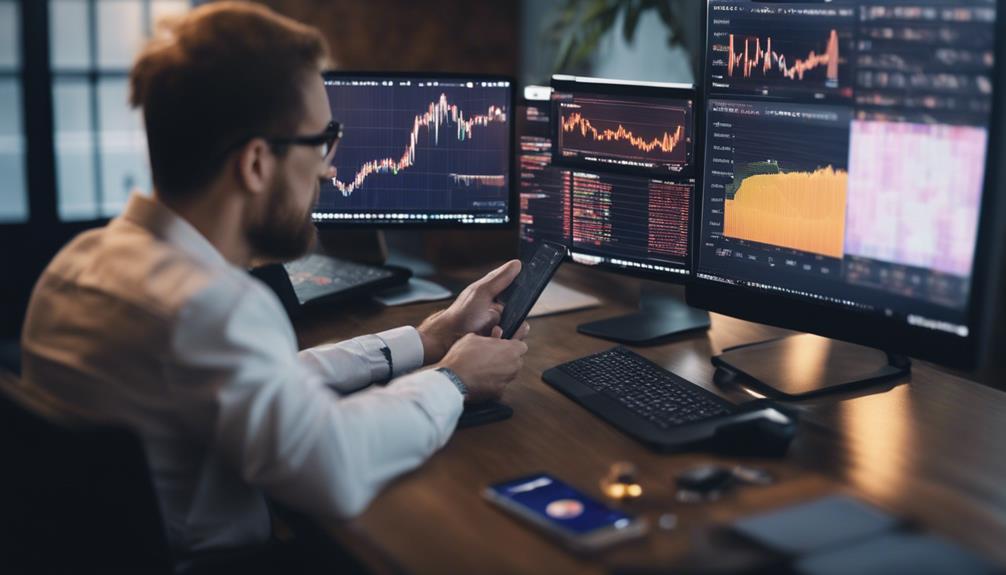
Optimizing trade fees is vital for enhancing the performance of your Bitcoin IRA. When considering investment options within traditional and Roth IRAs, it's important to factor in trade fees to maximize returns and minimize costs.
Trade fees for investing in a Bitcoin IRA typically range from 0.5% to 1% per trade. These fees are deducted directly from the accounts involved, impacting the overall growth of your investment. Understanding and comparing trade fees across different custodians is key to avoiding unnecessary expenses.
Some custodians may also charge additional fees for services like account management or transfers, so it's important to be aware of all potential costs. Regularly reviewing and managing trade fees can help optimize the performance of your Bitcoin IRA over time, ensuring that your investment remains cost-effective and aligned with your financial goals.
Handling Annual Account Fee
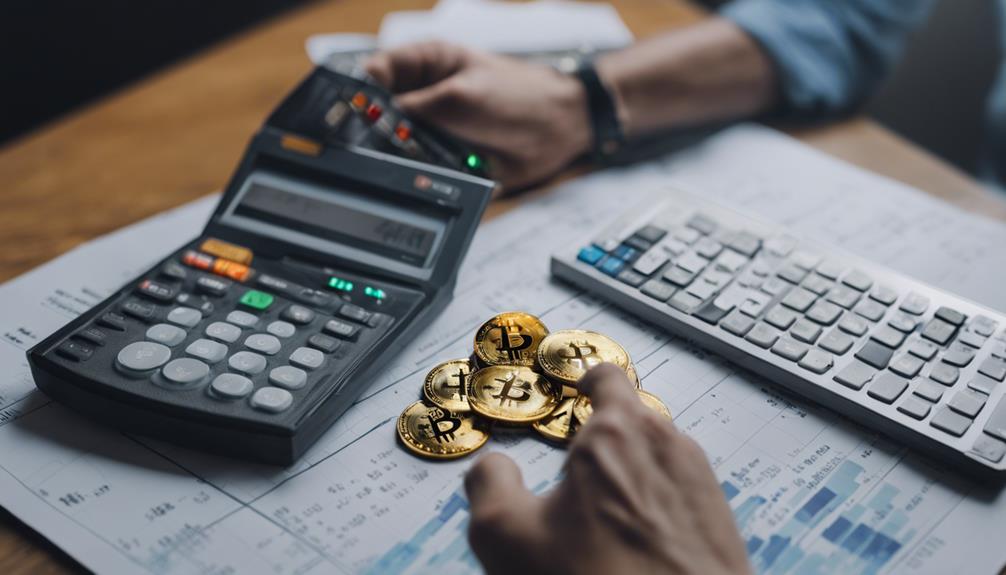
Managing the annual account fee for your Bitcoin IRA is essential for maximizing your investment returns and controlling costs effectively. Here are three key points to keep in mind when handling the annual account fee:
- Understand the Fee Structure: The annual account fee for a Bitcoin IRA typically falls within the range of $195 to $295. This fee encompasses important services such as account management, reporting, and custodial services. It's deducted directly from your IRA account balance.
- Explore Fee Discounts: Some providers may offer fee discounts or waivers based on factors like account size or promotional offers. It's beneficial to inquire about any potential discounts that could help reduce your overall costs and increase your returns.
- Compare and Evaluate: Understanding and comparing annual account fees across different Bitcoin IRA providers is essential. By evaluating fee structures and potential discounts, you can make informed decisions that align with your investment goals and financial strategy.
Transferring Funds to Gemini Account
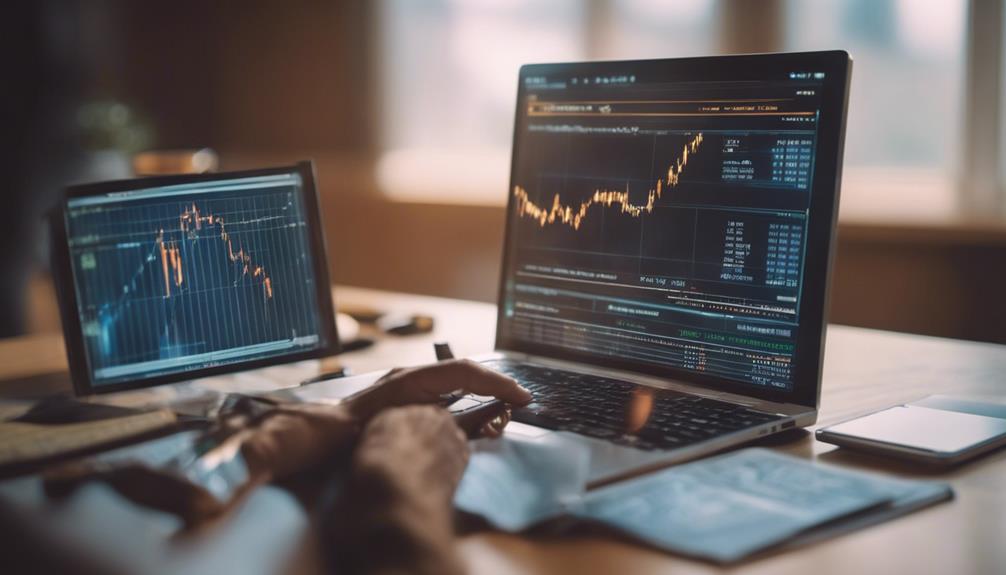
Initiate the transfer of funds from your Directed IRA to your Gemini trading account for seamless crypto investments.
Gemini, a regulated trust company with insurance coverage for client assets, allows you to trade over 20 cryptocurrencies. To begin, you can transfer funds from your Directed IRA to your Gemini account.
Gemini charges a trade fee ranging from 0.25% to 0.35% for transactions. This fee is important to factor into your investment plans. Once the funds are in your Gemini account, you can start investing in various cryptocurrencies.
Directed IRA facilitates this transfer process, making it easier for you to navigate the crypto investment landscape. After trading on Gemini, it's advisable to contemplate moving your crypto assets to cold storage for enhanced security.
Frequently Asked Questions
How Do I Invest in Bitcoin in My Ira?
To invest in Bitcoin in your IRA, you need to follow a few steps:
- Open a self-directed account with a custodian that allows Bitcoin investments.
- Transfer funds from your traditional IRA or make new contributions to fund the Bitcoin purchase.
- Purchase Bitcoin through the custodian's platform within your IRA.
- Secure your Bitcoin in a digital wallet or cold storage to ensure its safety.
- Monitor your Bitcoin investments within your IRA regularly to manage risks effectively and track performance.
Is It a Good Idea to Have a Bitcoin Ira?
Having a Bitcoin IRA can be a wise choice for long-term financial planning. It offers tax advantages, diversification, and potentially higher returns compared to traditional IRAs.
Investing in cryptocurrencies through a Bitcoin IRA provides exposure to a growing asset class. The security features in place help safeguard your investments.
How Much Does It Cost to Set up a Bitcoin Ira?
Setting up a Bitcoin IRA can cost between $50 to $100 initially. Some custodians may charge around $195 per year for account maintenance. Transaction fees for buying Bitcoin within the IRA can vary from 1% to 15% per trade.
Additional costs like wire transfer fees for funding usually range from $25 to $50 per transfer. To optimize returns, compare fee structures of different custodians carefully.
How to Invest in Bitcoin Step by Step?
Looking to invest in Bitcoin step by step?
Start by choosing a custodian that offers Bitcoin IRA services. Provide personal details and fund your account. Select Bitcoin or other cryptocurrencies for your IRA. Use secure storage options provided by the custodian.
Regularly monitor your investments and consider seeking professional advice for best results.
Ready to embark on the world of Bitcoin investing? Follow these steps to get started on your Bitcoin IRA journey!
Conclusion
As you navigate the complexities of investing in a Bitcoin IRA, remember that each step is like a piece of a puzzle coming together to form a secure financial future.
Just as Bitcoin revolutionized the world of finance, your decision to invest in a Bitcoin IRA symbolizes your commitment to embracing the future of wealth management.
By following this step-by-step guide with diligence and care, you're taking a bold step towards securing your financial independence.
Sarah develops and leads our educational initiatives to help clients understand the intricacies of investing in gold and cryptocurrencies. Her role is vital in ensuring that our clients are well-informed and confident in their investment decisions. Sarah’s expertise and commitment to education are key to empowering our clients.





